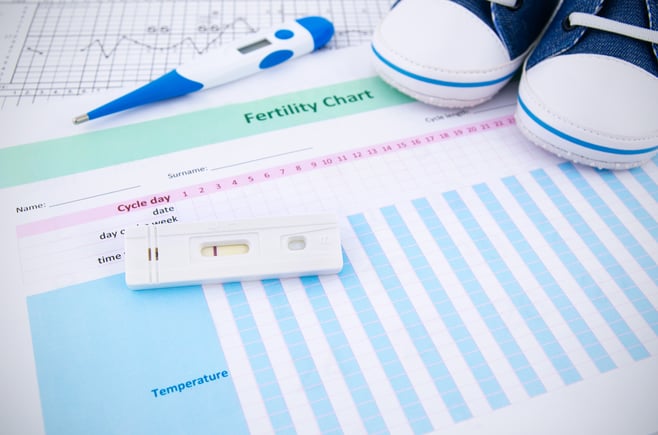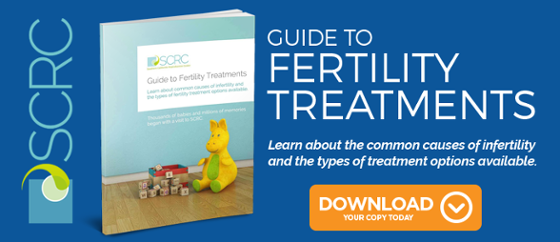 The vast majority of fertility clinic patients only seek out fertility testing when they begin to suspect that something is wrong, usually after a long period of unsuccessfully trying to get pregnant.
The vast majority of fertility clinic patients only seek out fertility testing when they begin to suspect that something is wrong, usually after a long period of unsuccessfully trying to get pregnant.
It’s a natural assumption to think that we’ll be able to conceive when we want to, but with the average age of first pregnancies getting later all the time, this “wait and see approach” can have severe disadvantages. When it comes to fertility, especially from your thirties onward, one of the most precious resources you have is time.
Fortunately, it is possible to take control of your reproductive health at any age, whether you’re single or in a relationship, considering getting pregnant or just looking towards the future. Consulting a fertility expert for a checkup and a series of straightforward tests can offer you an accurate picture of where you stand, and help you make a plan. Here’s a checklist of fertility tests to talk to your doctor about.
General fertility tests
First, we have the front-line general fertility tests which give you a general snapshot of your current fertility. Most of these are simple blood tests to check that your body is functioning well, and to check your ovarian reserve: the quantity and quality of your remaining eggs.
STI screening (blood test)
Sexual health can play a large role in your fertility, so making sure that you do not have any lingering untreated infections is important. Scarring and inflammation from STIs and Pelvic Inflammatory Disease can block fallopian tubes and make it very difficult to become pregnant.
Hormone levels
Hormones are fundamental to your reproductive function, so you will want to make sure that your body is correctly producing everything you need to conceive. Some hormone levels can give your doctor an idea of how your ovaries are working and an indication of your ovarian reserve. Your fertility expert may order some or all of the following hormone tests.
- Thyroid levels (TSH) (blood test): Thyroid disorders, including hyperthyroidism (an overactive thyroid), hypothyroidism (an underactive thyroid) or thyroid autoimmune diseases can have a cascading effect on many other important hormones in your body. A dysregulated thyroid will cause many problems, especially related to fertility. A quick check of your thyroid levels can offer your doctor a lot of valuable information about potential fertility issues.
- Anti-mullerian hormone (AMH) (blood test): AMH is a hormone produced in your ovaries by tiny early-stage follicles as they grow to a stage where they can potentially produce eggs for ovulation. While taking an AMH level won’t tell you much about the quality of the eggs you are producing, it can give an idea of whether or not there is still a significant number of growing follicles. From there the doctor can make a judgement on whether you are still likely to produce viable eggs.
- Follicle-stimulating hormone (FSH) (blood test): Produced by your pituitary gland, this is one of the most significant hormones related to ovulation. Its job is to stimulate growth and maturity in your ovarian follicles so that an egg is produced and released during ovulation. FHS production is ongoing until you ovulate, and if you don’t ovulate, the FHS levels will continue to rise. When tested early in the menstrual cycle, an FHS level can indicate how much effort your body is putting in to help you ovulate. High levels are a sign of diminishing ovarian reserve.
- Luteinizing hormone (LH) (urine or blood test): LH works alongside FHS and regulates both the menstrual cycle and ovulation. Levels of LH rise quickly just before ovulation, about halfway through your cycle, which is known as an LH surge. Depending on the stage of your cycle, and LH test can tell whether you have ovulated, or indicate issues with menstruation or ovulation. High LH levels outside of the LH surge are correlated with problems such as polycystic ovary syndrome (PCOS), suggest premature menopause and diminished ovarian reserve or a genetic or congenital condition that affects the production of hormones. Low LH levels are associated with irregular or absent menstruation or problems with the pituitary gland.
- Estradiol (blood test): Secreted by maturing follicles, estradiol is a form of estrogen, the major female reproductive hormone. High levels of estradiol are another sign that your body is having to work especially hard to produce eggs, and can mean your ovarian reserve is getting low, or they could be pointing to an issue with the thyroid. Elevated levels can also interfere with the function of FHS and the ovulation process. Low levels of estradiol can point to PCOS or pituitary issues.
- Prolactin (blood test): Prolactin is related to your thyroid and pituitary function. It is a hormone which regulates and inhibits FSH and (FSH) and gonadotropin-releasing hormone (GnRH). If your prolactin levels are elevated, you may have problems with ovulation. High levels can indicate hypothyroidism or problems with your pituitary gland, and is sometimes related to PCOS.
Antral follicle count (ultrasound)
Your ovarian follicles hold all the immature eggs awaiting their chance to mature, and are present in various stages of growth. Antral follicles are just large enough to be seen and counted with the help of an ultrasound. The more antral follicles you have, the more microscopic primordial follicles (holding immature eggs) you are likely to have. A high follicle count indicates a healthy ovarian reserve, while a low count suggests that the reserve is diminishing.
Further diagnostic fertility tests for women
For many women, the above tests are enough to determine the state of their ovarian reserve and their current level of reproductive function. If the tests do indicate a problem, your fertility specialist is likely to order further testing to get you a clear diagnosis and help you formulate a plan of treatment or fertility preservation. These are some more advanced fertility tests which can give your fertility specialist valuable information about your reproductive health.
Cervical mucus test
Problems with cervical mucus can get in the way of conception. Issues with consistency can make it difficult for sperm to reach the egg at all, while hostile antibodies in cervical mucus can actually kill sperm before they have a chance to fertilize the egg. A cervical mucus test allows fertility experts to examine a sample of cervical mucus to ensure that everything is in order.
Hysterosalpingogram (HSG)
A hysterosalpingogram is a special type of x-ray conducted with a radio-opaque dye to allow your doctor to see whether there are any blockages in your uterus or fallopian tubes which could affect your ability to get pregnant or carry a pregnancy to term.
Hysteroscope
A hysteroscope test uses a small camera inserted through the cervix into the uterus. If an HSG test shows that there may be an issue with your uterus, a hysteroscope can be used to allow a fertility specialist to look for scarring, growths, or other abnormalities and take pictures of any findings.
Saline hysterogram (SHG)
Also known as a saline infusion sonogram (SIS), water ultrasound, or sono-hysterogram, this test takes place during a transvaginal ultrasound. Saline solution is injected into the uterus using a tiny catheter inserted through the cervix. This expands the walls of the uterus and allows the fertility expert to check for fibroids, polyps, or other growths in the uterine wall.
Laparoscopy
A laparoscopy is an exploratory procedure performed under general anesthesia, where tiny fiber optic camera is inserted into the abdominal cavity. This camera allows the surgeon a clear view of the ovaries, fallopian tubes, and uterus, and can be used to look for problems such as scarring, adhesions, and endometriosis deposits. Often, the surgeon can remove these abnormalities during the laparoscopy using a laser.
Endometrial biopsy
An endometrial biopsy is performed when doctors suspect that the lining of your uterus may not be thick enough to allow a fertilized egg to implant. The procedure takes place just before the start of menstruation. A tiny sample of tissue is scraped from the lining (endometrium) to check whether hormones are working to thicken the lining. It can also reveal inflammation or infection of the endometrium.
Asking your doctor about fertility testing can empower you to make strong choices about your reproductive future, whether that means changing your timeline for starting a family, or looking into fertility preservation options such as egg freezing. If all your results are great, it can give you the peace of mind you need. If you think you are likely to want children in the future, don’t hesitate to look into your fertility status now. Waiting to find out how fertile you are until there is already a problem may mean losing precious months or even years by the time you are ready to start treatment.
Share this on social media:





